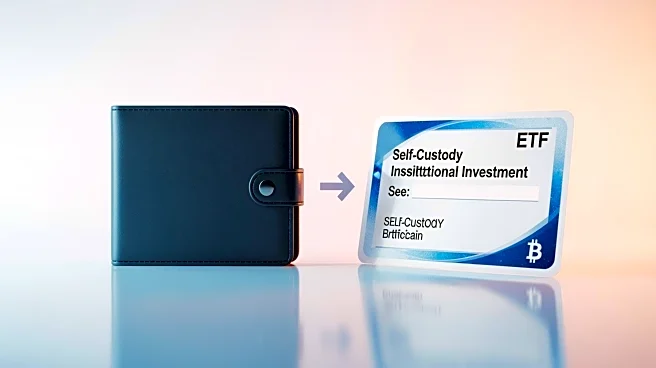What's Happening?
Martin Hiesboeck, head of blockchain research at Uphold, has declared the end of the self-custody era for Bitcoin, as major players increasingly favor exchange-traded funds (ETFs). According to Hiesboeck, tax incentives and improved institutional infrastructure
are driving this shift. BlackRock's iShares spot Bitcoin ETF (IBIT) has facilitated over $3 billion worth of Bitcoin conversions from whales, marking the first decline in self-custodied Bitcoin in 15 years. Recent regulatory changes by the U.S. Securities and Exchange Commission, allowing for the redemption of cryptocurrency ETFs in kind, have accelerated this transition. This innovation permits authorized participants to directly exchange cryptocurrency for fund shares, which is more efficient and potentially more tax-advantageous than cash redemption.
Why It's Important?
The shift from self-custody to ETFs represents a significant change in how Bitcoin is integrated into the traditional financial system. This move could lead to broader acceptance and use of Bitcoin within institutional frameworks, potentially increasing its stability and market value. However, it also marks a departure from the original cryptocurrency ethos of decentralization and personal control, encapsulated in the mantra 'not your keys, not your coins.' This transition could impact individual investors who prefer self-custody for privacy and control reasons, while benefiting institutional investors who seek regulatory compliance and tax advantages.
What's Next?
As Bitcoin becomes more integrated into traditional financial systems, further regulatory developments are expected. The U.S. Securities and Exchange Commission's recent changes could pave the way for more cryptocurrency ETFs, potentially increasing institutional investment in Bitcoin. Other jurisdictions, such as the EU, UK, and Australia, are also accelerating the development of cryptocurrency trading tools, indicating a global trend towards institutional adoption. This could lead to increased market stability and growth, but may also spark debates about the future of cryptocurrency's decentralized nature.
Beyond the Headlines
The shift towards ETFs and institutional adoption of Bitcoin raises ethical and cultural questions about the future of cryptocurrency. As Bitcoin moves away from its decentralized roots, discussions about privacy, control, and the original purpose of cryptocurrencies are likely to intensify. This transition could also influence the development of new blockchain technologies and financial products, as the industry adapts to changing investor preferences and regulatory landscapes.

















